
-
 The Board Patrol now carries Sand & Grass Protectors
The Board Patrol now carries Sand & Grass Protectors -
 New Everyday Low Prices on Rigging Hardware Take a Look at 20% Lower Prices on Average
New Everyday Low Prices on Rigging Hardware Take a Look at 20% Lower Prices on Average -
 Cape Town, Music Curation, Shout out & Podcast Interview VAMO
Cape Town, Music Curation, Shout out & Podcast Interview VAMO -
 Get One-Stop Shopping on Fabric Printing & Borderless Framing
Get One-Stop Shopping on Fabric Printing & Borderless Framing -
 OpenAI's New Browser Could Change the Internet Forever
OpenAI's New Browser Could Change the Internet Forever -
 Malibu Autobahn Rolls Through LA with Joseline Hernandez for Zeus Network
Malibu Autobahn Rolls Through LA with Joseline Hernandez for Zeus Network -
 Studio Animal Services, LLC - Kittens Available for Production
Studio Animal Services, LLC - Kittens Available for Production -
 8' x 20' Fabric Stretch Display
8' x 20' Fabric Stretch Display -
 Wireless Teleprompter Rig Takes to the Streets of Midtown Manhattan
Wireless Teleprompter Rig Takes to the Streets of Midtown Manhattan -

-
 Westside Digital Mix: Venice Edition
Westside Digital Mix: Venice Edition -
 Film in Palmdale
Film in Palmdale
Scenic Locations, Valuable Incentives -
 Los Angeles Properties for
Los Angeles Properties for
Filming, Events, Activations
Pop Ups and Photo -
 Burbank Stages can now be painted any color to match
Burbank Stages can now be painted any color to match -
 Custom Prop Rentals: Bringing Your Dream Event to Life with Life-Size Magic
Custom Prop Rentals: Bringing Your Dream Event to Life with Life-Size Magic -
 New Arrivals
New Arrivals -
 Step and Repeat LA Creates 8' x 30' Media Wall for FIFA World Cup 2026 'One Year to Go' Celebration in Los Angeles
Step and Repeat LA Creates 8' x 30' Media Wall for FIFA World Cup 2026 'One Year to Go' Celebration in Los Angeles -
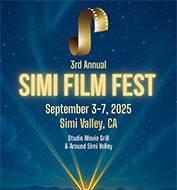
-
 Studio Wings moves offices, flight operations and aircraft to the Santa Fe Airport
Studio Wings moves offices, flight operations and aircraft to the Santa Fe Airport -
 WeCutFoam Specializes in Fabrication of Signs, Logos and Letters for Company Summits
WeCutFoam Specializes in Fabrication of Signs, Logos and Letters for Company Summits -
 Studio Tech Provides Wi-Fi And Internet for The Superman Movie Press Junket
Studio Tech Provides Wi-Fi And Internet for The Superman Movie Press Junket -
 Superman movie Press Junket @ Buttercup Venues
Superman movie Press Junket @ Buttercup Venues -
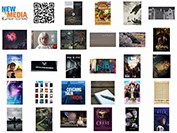 Honoring Stories Worth Telling Since 2009
Honoring Stories Worth Telling Since 2009
All Ages - All Cultures - All Media -
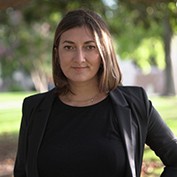 Xenia Lappo Joins ESTA as New Program Manager for Membership & Events
Xenia Lappo Joins ESTA as New Program Manager for Membership & Events -
 NOMINATIONS ANNOUNCED FOR THE LOCATION MANAGERS GUILD INTERNATIONAL AWARDS
NOMINATIONS ANNOUNCED FOR THE LOCATION MANAGERS GUILD INTERNATIONAL AWARDS -
 Nathan Wilson and Chris Connors discuss creating for children's television with ZEISS Supreme Prime lenses
Nathan Wilson and Chris Connors discuss creating for children's television with ZEISS Supreme Prime lenses -
 Luxury Solar Restroom Trailer Sustainability
Luxury Solar Restroom Trailer Sustainability -
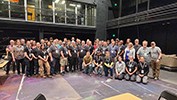 Midwest Rigging Intensive Returns with Touring Rigging Theme
Midwest Rigging Intensive Returns with Touring Rigging Theme -
 Custom Pool Floats That Steal the Show
Custom Pool Floats That Steal the Show -
 Malibu Autobahn Dresses Coachella 2025 for Shoreline Mafia
Malibu Autobahn Dresses Coachella 2025 for Shoreline Mafia -
 Thunder Studios Wins Nine 2025 Telly Awards
Thunder Studios Wins Nine 2025 Telly Awards -

-
 LCW Props Is Your One Stop Prop Shop
LCW Props Is Your One Stop Prop Shop -
 Venues in Los Angeles for Activations and Filming
Venues in Los Angeles for Activations and Filming -

-

-
 Honoring Stories Worth Telling Since 2009 - All Ages - All Cultures - All Media
Honoring Stories Worth Telling Since 2009 - All Ages - All Cultures - All Media -
 Buttercup Venues Accepting Submissions to Help Property Owners Monetize Their Spaces
Buttercup Venues Accepting Submissions to Help Property Owners Monetize Their Spaces -
 Studio Animal Services Stars in Latest Fancy Feast Commercial
Studio Animal Services Stars in Latest Fancy Feast Commercial -
 WDM celebrates Summer at the famed Michael's Santa Monica
WDM celebrates Summer at the famed Michael's Santa Monica -
 Studio Technical Services Inc.
Studio Technical Services Inc.
Spring 2025 Newsletter -
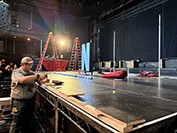 From Call to Setup: Coffee House Industries Lights Up Netflix Is a Joke at the Avalon
From Call to Setup: Coffee House Industries Lights Up Netflix Is a Joke at the Avalon -
 WLA3D produces scale model for Fox Grip
WLA3D produces scale model for Fox Grip -
 Filming Locations and Event Venues Los Angeles
Filming Locations and Event Venues Los Angeles -
 Scenic Expressions Launches a Full-Service Liquidation Solution for the Film & TV Industry
Scenic Expressions Launches a Full-Service Liquidation Solution for the Film & TV Industry -
 Producers Need Reel Monster Trucks for Reel Productions
Producers Need Reel Monster Trucks for Reel Productions -
 Meet Michael Way | Engineer
Meet Michael Way | Engineer -
 In Development: ZEISS Virtual Lens Technology Elevating VFX with physically based lens effects
In Development: ZEISS Virtual Lens Technology Elevating VFX with physically based lens effects -
 (2) PREMIER AV ACTIONS
(2) PREMIER AV ACTIONS -
 RSVP - 80 Films & Tech - Meet the Visionaries - EMMY, Telly, Peabody winners and more
RSVP - 80 Films & Tech - Meet the Visionaries - EMMY, Telly, Peabody winners and more -
 New Arrivals Are Here - Check Out LMTreasures.com
New Arrivals Are Here - Check Out LMTreasures.com -
 Film-Friendly Retail Space at Tejon Outlets
Film-Friendly Retail Space at Tejon Outlets -
 Behind Every Great Production, There's a Great Move
Behind Every Great Production, There's a Great Move -
 Buttercup Venues' recent work with Invisible Dynamics & Blue Revolver
Buttercup Venues' recent work with Invisible Dynamics & Blue Revolver -
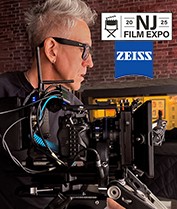 Join ZEISS Cinema at this year's NJ Film Expo on Thursday, May 1
Join ZEISS Cinema at this year's NJ Film Expo on Thursday, May 1 -
 The Location Managers Guild International (LMGI) announces that its 12th Annual LMGI Awards Show will be held on Saturday, August 23, 2025
The Location Managers Guild International (LMGI) announces that its 12th Annual LMGI Awards Show will be held on Saturday, August 23, 2025 -
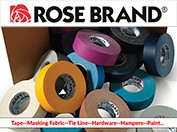 Get Your Production Supplies Now While Prices Are Stable*
Get Your Production Supplies Now While Prices Are Stable*
Rose Brand Is Your One Stop Shop -
 Immersive Sound for your next production from TrueSPL
Immersive Sound for your next production from TrueSPL -
 WeCutFoam Fabricating Large Scale Props and Decor for Companies & Products Launching Events
WeCutFoam Fabricating Large Scale Props and Decor for Companies & Products Launching Events -
 The "CA-Creates" eGroup Network
The "CA-Creates" eGroup Network -
 The Location Managers Guild International Announces the Newly Elected 2025 LMGI Board of Directors
The Location Managers Guild International Announces the Newly Elected 2025 LMGI Board of Directors -
 Production Moves: How to Find the Most Qualified Mover
Production Moves: How to Find the Most Qualified Mover -
 SAG-AFTRA Talent Payments @ Production Payroll Services
SAG-AFTRA Talent Payments @ Production Payroll Services -

-

-
 New Everyday Low Prices on Rigging Hardware
New Everyday Low Prices on Rigging Hardware
Take a Look at 20% Lower Prices on Average -
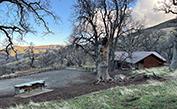 Tejon Ranch introduces its Premium Ranch Cabins
Tejon Ranch introduces its Premium Ranch Cabins -
 Our Enchanting Garden Collection is Growing!
Our Enchanting Garden Collection is Growing! -

-

-
 Top Entertainment CEOs & Industry Titans Join Forces for Groundbreaking New Media Film Festival®
Top Entertainment CEOs & Industry Titans Join Forces for Groundbreaking New Media Film Festival® -
 Tejon Ranch opens Diner location for your next Production
Tejon Ranch opens Diner location for your next Production -
 Discover the Performance of ZEISS Otus ML
Discover the Performance of ZEISS Otus ML
Deep Dive into the Features and Technology -
 Step and Repeat LA Enhances Printing Capabilities with HP Latex R1000 Plus Flatbed Printer
Step and Repeat LA Enhances Printing Capabilities with HP Latex R1000 Plus Flatbed Printer -
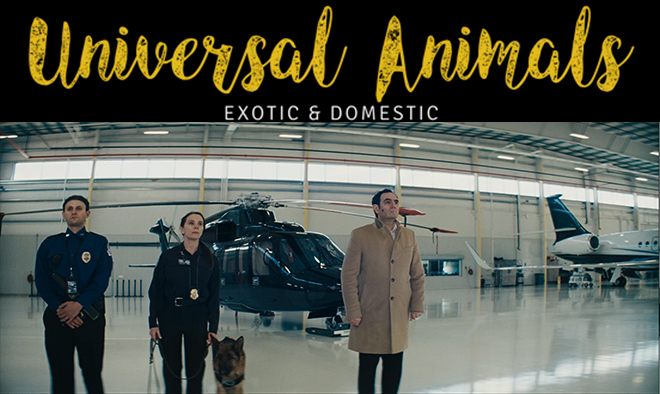 Universal Animals cast the dog in Anora!
Universal Animals cast the dog in Anora! -
 Burbank Stages is Now Open with upgraded support space
Burbank Stages is Now Open with upgraded support space -

-
 Buttercup Venues Grows Portfolio with Exciting New Locations for Filming and Events
Buttercup Venues Grows Portfolio with Exciting New Locations for Filming and Events -
 Fashion District Suite 301
Fashion District Suite 301 -
 Something new is coming for Photographers
Something new is coming for Photographers
Mark Your Calendar - February 25th -
 WLA3D completes scale model of vintage Knott's Berry Farm attraction
WLA3D completes scale model of vintage Knott's Berry Farm attraction -
 New Media Film Festival has invited you to submit your work via FilmFreeway!
New Media Film Festival has invited you to submit your work via FilmFreeway! -
 WeCutFoam Collaborated Once More with Children's Miracle Network Hospitals
WeCutFoam Collaborated Once More with Children's Miracle Network Hospitals -

-
 EigRig SLIDE-R1 Revolutionizes Filmmaking Production with Innovation
EigRig SLIDE-R1 Revolutionizes Filmmaking Production with Innovation -
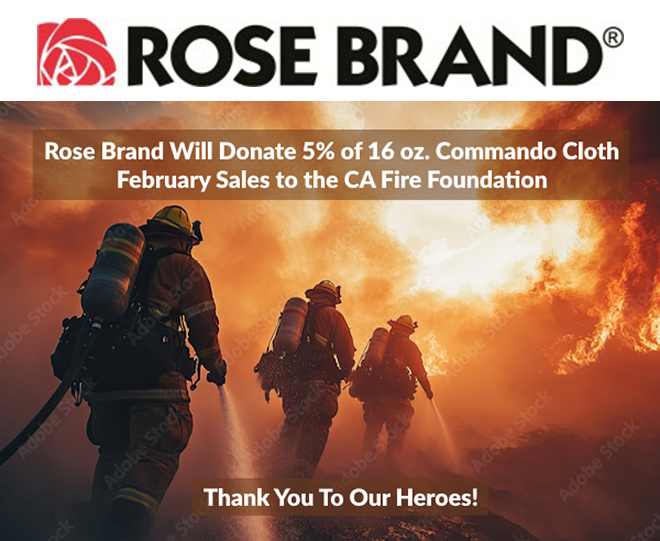
-

-

-
 Practicals Rental Lighting Welcomes the Jucolor UV Flatbed Printer
Practicals Rental Lighting Welcomes the Jucolor UV Flatbed Printer -
 GBH Maintenance Inc. Has Grown
GBH Maintenance Inc. Has Grown -
 The Rarest Stars Shine Brightest
The Rarest Stars Shine Brightest -
 Affected by the ongoing California wildfires
Affected by the ongoing California wildfires -
 Get One-Stop Shopping...
Get One-Stop Shopping... -
 Buttercup Venues Expands
Buttercup Venues Expands -

-
 Los Angeles Office Spaces: Versatile Backdrops for Filming
Los Angeles Office Spaces: Versatile Backdrops for Filming -
 All Creatures Great and small holiday commercial for Montefiore hospital
All Creatures Great and small holiday commercial for Montefiore hospital -
 DEEP CLEANS WAREHOUSE FOR SUPER BOWL COMMERCIAL
DEEP CLEANS WAREHOUSE FOR SUPER BOWL COMMERCIAL -
 New Production Hub in Los Angeles
New Production Hub in Los Angeles -
 Carlos R. Diazmuñoz
Carlos R. Diazmuñoz -
 The Secret Behind Hollywood Premieres
The Secret Behind Hollywood Premieres -
 WeCutFoam Specializes in Decor
WeCutFoam Specializes in Decor -
 Studio Technical Services Inc.
Studio Technical Services Inc.
Fall 2024 Update -
 New Media Film Festival has invited you to submit your work
New Media Film Festival has invited you to submit your work -

-
 Available again!
Available again!
Studio 301 - 16,000 Sq. Ft. -
 Elevate Your Production with SoundPressure Labs'
Elevate Your Production with SoundPressure Labs' -
 Pro-Cam expands rental operation...
Pro-Cam expands rental operation... -
 NATIONAL ASSOCIATION OF LATINO INDEPENDENT PRODUCERS
NATIONAL ASSOCIATION OF LATINO INDEPENDENT PRODUCERS -
 New Sony A9 III Reviews
New Sony A9 III Reviews -
 New, Heavyweight, Lustrous, Shimmering 56" Elana IFR Fabric
New, Heavyweight, Lustrous, Shimmering 56" Elana IFR Fabric -
 JOIN US IN ORLANDO THIS NOVEMBER!
JOIN US IN ORLANDO THIS NOVEMBER! -
 BLUE MOON CLEANING
BLUE MOON CLEANING
RESTORES MUSIC-MAKING -
 Another Collaboration Between WeCutFoam and Event Planner
Another Collaboration Between WeCutFoam and Event Planner -
 BLUE MOON CONGRATULATES 2024 COLA FINALISTS
BLUE MOON CONGRATULATES 2024 COLA FINALISTS -
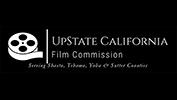 Fall Production News & Events
Fall Production News & Events -
 Not just green, but mighty Verde
Not just green, but mighty Verde -
 Introducing...
Introducing...
Restaurant/Bar/Venue in Encino -

-
 ESTA and Earl Girls, Inc. Launch $100,000 TSP Fundraising Challenge
ESTA and Earl Girls, Inc. Launch $100,000 TSP Fundraising Challenge -
 There's still time to register for ESTA's Plugfest
There's still time to register for ESTA's Plugfest -

-
 BLUE MOON CLEANING SEES SPIKE IN MAJOR LA FEATURE FILMING
BLUE MOON CLEANING SEES SPIKE IN MAJOR LA FEATURE FILMING -
 "The Secret Behind Hollywood Premieres"
"The Secret Behind Hollywood Premieres" -

Amoeba Records on Sunset
&
SuperMarket in K-Town -
 "Alice in Wonderland" tea party brought to life...
"Alice in Wonderland" tea party brought to life... -
 Filming With Production Ready Aviation Equipment
Filming With Production Ready Aviation Equipment -

-

-
 A5 Events - Take Your Event to The Next Level
A5 Events - Take Your Event to The Next Level -
 The Original Amoeba Records Venue
The Original Amoeba Records Venue
& The SuperMarket -
 Doc Filmmaker Jennifer Cox
Doc Filmmaker Jennifer Cox -
 Red, White or Blue Rental Drapes
Red, White or Blue Rental Drapes -
 Introducing Tuck Track Invisible Framing for Fabric Prints
Introducing Tuck Track Invisible Framing for Fabric Prints -

-
 American Movie Company's LED Wall Studio Sale
American Movie Company's LED Wall Studio Sale -
 Black 360 Independence Studio
Black 360 Independence Studio -
 Nominations are open for the 2025 ESTA Board of Directors!
Nominations are open for the 2025 ESTA Board of Directors! -
 Custom Prop Rentals is moving to a new, larger location!
Custom Prop Rentals is moving to a new, larger location! -
 Jazz Up Your Event with the Custom Embrace Display
Jazz Up Your Event with the Custom Embrace Display -
 Pro-Cam opens Las Vegas branch, expanding rental operation
Pro-Cam opens Las Vegas branch, expanding rental operation -
 New ShowLED Starlight Drops
New ShowLED Starlight Drops -
 Costume House Sidewalk Sale
Costume House Sidewalk Sale -
 Working Wildlife's newly renovated 60 acre ranch available for Filming
Working Wildlife's newly renovated 60 acre ranch available for Filming -
 Location Manager Bill Bowling
Location Manager Bill Bowling
to Receive the Trailblazer Award -

-
 Mr. Location Scout is in Lake Tahoe
Mr. Location Scout is in Lake Tahoe -
 DreamMore Resort Fountain
DreamMore Resort Fountain -
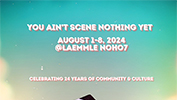 Valley Film Festival
Valley Film Festival
Greetings from the (818): -
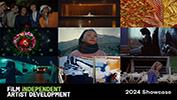 2024 Changemaker Awards and Artist Development Showcase
2024 Changemaker Awards and Artist Development Showcase -
 ZEISS Conversations with Jack Schurman
ZEISS Conversations with Jack Schurman -
 Collaboration Between WeCutFoam and Yaamava Resort & Casino
Collaboration Between WeCutFoam and Yaamava Resort & Casino -
 Location Managers Guild International Awards
Location Managers Guild International Awards -
 Molding Cloth
Molding Cloth
Make Fabulous Textured Designs -
 WeCutFoam Specializes in Large Events
WeCutFoam Specializes in Large Events -
 Introducing Truck Track Invisible Framing for Fabric Prints
Introducing Truck Track Invisible Framing for Fabric Prints -
 GBH Maintenance is back at Herzog Wine Cellars
GBH Maintenance is back at Herzog Wine Cellars -
 SATE NORTH AMERICA 2024
SATE NORTH AMERICA 2024 -
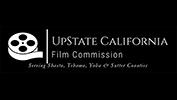 Production News & Events Summer Edition
Production News & Events Summer Edition -
 Four Amazing Architectural Locations!
Four Amazing Architectural Locations! -
 * BIG SAVINGS * ON BIG STUDIOS
* BIG SAVINGS * ON BIG STUDIOS -
 Let Your Brand Stand Tall!
Let Your Brand Stand Tall! -
 Sue Quinn to Receive Lifetime Achievement Award
Sue Quinn to Receive Lifetime Achievement Award -
 ZEISS Cinema at Filmscape Chicago
ZEISS Cinema at Filmscape Chicago -
 GBH Maintenance Is the Standard for Commercial Maintenance
GBH Maintenance Is the Standard for Commercial Maintenance -
 Come Join Us at Cine Gear Expo 2024
Come Join Us at Cine Gear Expo 2024 -
 Available now:
Available now:
6th Street Gallery & Venue -
 Thunder Studios Triumphs with Five Telly Awards
Thunder Studios Triumphs with Five Telly Awards -
 Reddit Went Public IPO - WeCutFoam Was There With Decor
Reddit Went Public IPO - WeCutFoam Was There With Decor -
 AirDD's Hottest New Product
AirDD's Hottest New Product
for 2024 Events -
 GBH Maintenance Sets the Standard for Window Cleaning
GBH Maintenance Sets the Standard for Window Cleaning -
 Haigwood Studios collaboration with the UGA Dodd School of Art
Haigwood Studios collaboration with the UGA Dodd School of Art -

-
 RX GOES TO 11!
RX GOES TO 11!
with Mike Rozett -
 Don't Be A Square - Think Outside The Box!!
Don't Be A Square - Think Outside The Box!! -
 WeCutFoam Fabricates Realistic Lifesize Props
WeCutFoam Fabricates Realistic Lifesize Props -

-
 Exposition Park Stage/Venue
Exposition Park Stage/Venue -
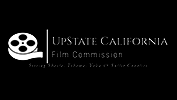 Production Update From UpState California Film Commission
Production Update From UpState California Film Commission -
 Base Camp With All The Extras
Base Camp With All The Extras -
 LAPPG AT THE ZEISS CINEMA SHOWROOM
LAPPG AT THE ZEISS CINEMA SHOWROOM -
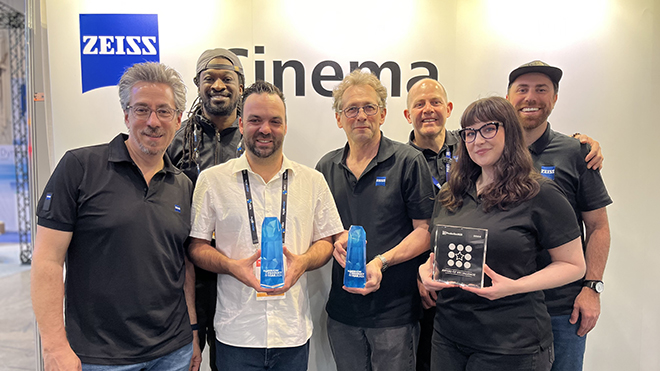 ZEISS Nano Primes and ZEISS CinCraft Scenario Received NAB Show 2024
ZEISS Nano Primes and ZEISS CinCraft Scenario Received NAB Show 2024 -
 Cranium Camera Cranes Introduces the all new Tankno Crane!
Cranium Camera Cranes Introduces the all new Tankno Crane! -
 Come Join Us at Cine Gear Expo 2024
Come Join Us at Cine Gear Expo 2024 -
 FAA Drill Burbank Airport
FAA Drill Burbank Airport
(federal aviation administration) -
 Exclusive Stahl Substitute Listing from Toni Maier-On Location, Inc.
Exclusive Stahl Substitute Listing from Toni Maier-On Location, Inc. -
 GBH Maintenance: Elevating Janitorial Standards Across Los Angeles
GBH Maintenance: Elevating Janitorial Standards Across Los Angeles -
 LOCATION CONNECTION has the best RANCHES FOR FILMING!
LOCATION CONNECTION has the best RANCHES FOR FILMING! -
 Hollywood Studio Gallery has Moved
Hollywood Studio Gallery has Moved -
 AirDD's inflatable "Kraken" designs transformed Masked Singers
AirDD's inflatable "Kraken" designs transformed Masked Singers -
 GBH maintenance Provided a Hollywood Shine for Herzog Wine Cellars
GBH maintenance Provided a Hollywood Shine for Herzog Wine Cellars -
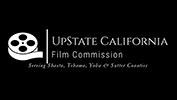 Production News & Events
Production News & Events
Spring Newsletter -
 Immersive Venue/ Black Box/ Stage
Immersive Venue/ Black Box/ Stage
2024 DTLA Arts District -

-
 Exclusive Malibu Listing from Toni Maier - On Location, Inc.
Exclusive Malibu Listing from Toni Maier - On Location, Inc. -
 Empowered Collaborates with Harlequin Floors
Empowered Collaborates with Harlequin Floors -
 Movie Premiere, TCL Chinese Theater
Movie Premiere, TCL Chinese Theater -
 Studio Tech provides services for the Grammy House
Studio Tech provides services for the Grammy House -
 Sora AI Text To Video
Sora AI Text To Video -
 New Apex Photo Studios
New Apex Photo Studios
Website: Rent Smarter, Create More & earn rewards! -

-
 How Ideal Sets Founder Harry Hou Cracked the Code on Affordable Standing Sets
How Ideal Sets Founder Harry Hou Cracked the Code on Affordable Standing Sets -
 New Storage & Co-Working Spaces In Boyle Heights near Studios
New Storage & Co-Working Spaces In Boyle Heights near Studios
For Short or long term rental -
 Auroris X Lands at A Very Good Space
Auroris X Lands at A Very Good Space -
 GBH Maintenance Completes Work on 33000ft Production Space
GBH Maintenance Completes Work on 33000ft Production Space -
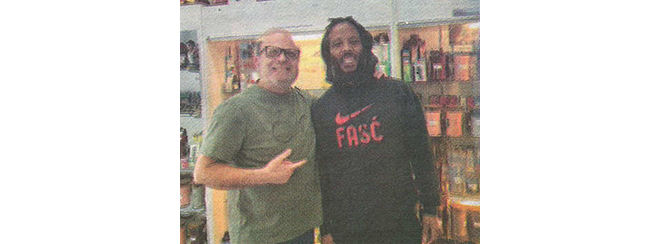 MUSICIAN ZIGGY MARLEY IS ANOTHER HAPPY.CUSTOMER OF MAILBOX TOLUCA LAKE'S 'DR. VOICE'
MUSICIAN ZIGGY MARLEY IS ANOTHER HAPPY.CUSTOMER OF MAILBOX TOLUCA LAKE'S 'DR. VOICE' -
 Custom Digitally Printed Commencement Banners & Backdrops
Custom Digitally Printed Commencement Banners & Backdrops -
 Rose Brand, SGM, Bill Sapsis, Sapsis Rigging, and Harlequin Floors Sponsor NATEAC Events
Rose Brand, SGM, Bill Sapsis, Sapsis Rigging, and Harlequin Floors Sponsor NATEAC Events -
 Kitty Halftime Show air for Animal Planet's Puppy Bowl
Kitty Halftime Show air for Animal Planet's Puppy Bowl -
 Georgia Animal Actors Persents Merlin
Georgia Animal Actors Persents Merlin -
 ESTA Launches Revamped NATEAC Website
ESTA Launches Revamped NATEAC Website -
 Mollie's Locations
Mollie's Locations -
 ZEISS Cinema News for February
ZEISS Cinema News for February -

-
 Seamless Fabric Backdrops up to 140ft x 16ft, Printed Floors...
Seamless Fabric Backdrops up to 140ft x 16ft, Printed Floors... -
 Check out all the Pioneer Gear at Astro!
Check out all the Pioneer Gear at Astro! -
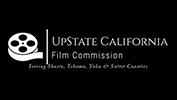 Production News & Events
Production News & Events -
 All of Your Production Supplies Gathered in Just One Place
All of Your Production Supplies Gathered in Just One Place -
 Meet the RED V-Raptor [X]
Meet the RED V-Raptor [X] -
 Sit Back and Enjoy Some Laughs
Sit Back and Enjoy Some Laughs -
 Mr. Location Scout Scouted and Managed Locations
Mr. Location Scout Scouted and Managed Locations -
 Introducing...
Introducing...
Landmark Restaurant in Encino -
 The White Owl Studio is celebrating all that is new!
The White Owl Studio is celebrating all that is new! -

-
 Last Call for NATEAC 2024 Proposals
Last Call for NATEAC 2024 Proposals -
 NOMINATIONS ANNOUNCED FOR THE
NOMINATIONS ANNOUNCED FOR THE
2024 MUAHS -
 Voted Best New Stage Rigging Products at LDI 2023
Voted Best New Stage Rigging Products at LDI 2023 -
 NEED MORE SPARKLE IN THE FLOOR?
NEED MORE SPARKLE IN THE FLOOR? -
 David Panfili to Appoint Michael Paul as President of Location Sound Corp.
David Panfili to Appoint Michael Paul as President of Location Sound Corp.
industry news
The Latest Industry News for the Exciting World of Production.
Creative Handbook puts together a bi-monthly newsletter featuring
up-to-date information on events, news and industry changes.
Add My Email
Cinematographers and other motion picture professionals gather to celebrate diversity, inclusion and discussion - and start a process of moving forward. In this third report, we detail the panel "Inspiring the Industry."
By: The American Society of Cinematographers | May 22, 2018
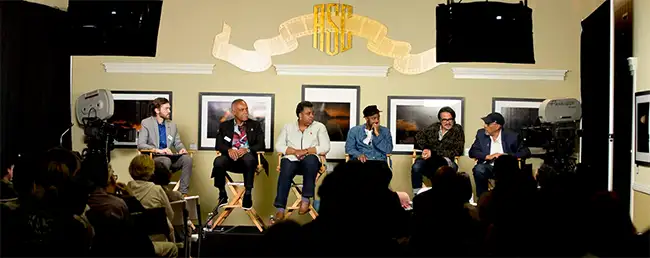
You'll find Part I of this story here and Part II here.
Event photos by Willie Toledo
In this third segment of the ASC Vision Committee's day-long event on diversity and inclusion held at the ASC Clubhouse on April 21, an impressive group of motion picture professionals talked about the challenges they face as people of color in the industry. The event, sponsored by Netflix, also featured a keynote address on the research done at the Annenberg Inclusion Initiative (Part I) and a discussion of women in the industry on strategies for gender parity (Part II).
Panelists participating in the day's ending discussion were camera operator Michelle Crenshaw and cinematographers Eduardo Mayen; Donald A. Morgan, ASC; John Simmons, ASC and Bradford Young, ASC.
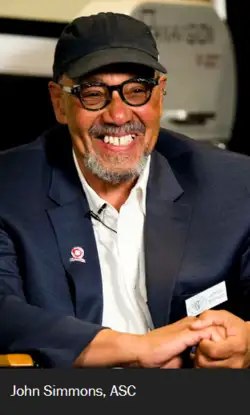
Moderator and American Cinematographer managing editor Jon Witmer asked the panelists what inspired them to enter the business, and everyone spoke about the importance of having mentors early in their careers. Simmons said historian/film director Carlton Moss was his mentor. "He lived with W.E.B. DuBois and was Lena Horne's manager and wrote The Negro Solider for Frank Capra," he recalled. "He looked at my photographs and told me that I had the eye of a cinematographer and started sending me copies of American Cinematographer. Then he sent me some film; I looked through the viewfinder and saw the shutter movement and it was all over after that."
Mayen said he grew up in El Salvador during that country's long civil war. "We couldn't go out and play, so movies were the inspiration," he said. "My dad wouldn't censor what we saw - he thought what was going on outside was scarier. I fell in love with cinema and began working for a production company, and Rodrigo Prieto [ASC] ended up being my mentor. Watching a professional cinematographer working, first-hand, planted the seed."
Young recounted how he was expected to follow the family mortuary business, but at Howard University he met Ethiopian filmmaker Haile Gerima: "I signed up for Third World cinema and it was 18 years of unpacking how much American movies impacted me and the notions of my community. I realized how much movies had turned me and my image of self upside down. It changed my spirit. I knew movies could start a revolution."
Crenshaw grew up in Detroit in a "labor, hands-on hard working environment." She started shooting and developing still photos when she was 16. "I fell in love with the instant gratification of images that reflected my environment," she said. "I went to Columbia College, took one film class and was hooked."
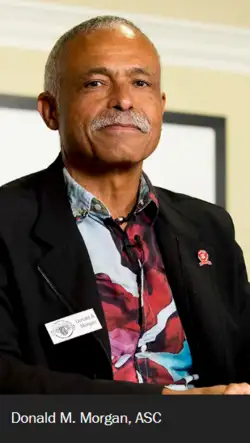
Morgan tried several different jobs before he got one in the mailroom at Los Angeles TV station KTTV. In his spare time, he'd go on stage. "I didn't understand it, but it seemed like it was fun," he said. "Then I got to be part of the crew." He found himself drawn to lighting, and his first mentor was Tom Schamp, a lighting director on Playhouse 90: "We had great conversations about multi-camera lighting, and that was a passion. I started looking at black-and-white movies and wanted to bring more of that look to what I was doing."
Witmer asked how to find a mentor. "You have to be willing to do work," said Crenshaw, who also called out Stephen H. Burum, ASC in the audience as another of her mentors. "If you show commitment and passion, eventually someone will take you under their wing. I got in the union in Chicago, and my whole career there was someone willing to support and embrace my passion. When I moved to California, I reached out to Johnny [Simmons]. I was a focus puller on an Isidore Mankofsky [ASC] movie where Johnny was operator."
"We all have a responsibility to reach back and open our doors and hearts to people who have a passion to do this," added Simmons. "I kept hearing about Joe Wilcox and Joseph Calloway [who was present at the event], these two black cinematographers, and I finally met them. There have been so many people on whose shoulders I stand, and so many people who presented obstacles that gave me the perseverance to overcome. What you're looking at on this panel are people who have persevered against obstacles that they couldn't really complain about."
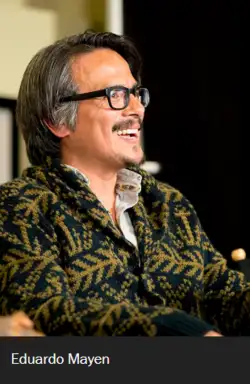
Simmons told the story of his first day on the job at Dove Films, founded by progressives Cal and Roz Bernstein: "I walk into a grip truck, and I see a grip box covered with derogatory images of black people, Cesar Chavez, Asians. I got out of that truck and called Carlton about this strange situation. He asked, 'Do you want to be a cinematographer? Do you know any black people doing this?'" He persevered.
Mayen noted that receiving the International Camera Guild's Emerging Cinematographer Award was crucial in allowing his career to flourish: "It gives loaders and camera assistants a chance to showcase their work and get exposure and more opportunities. That's a testament to what the union is doing now."
Young asked if film school is even relevant. "I used to be quite torn about this question," he said. "I went to film school and it wasn't always enjoyable. I saw people who didn't go to film school out in the world making films. Now I'm trying to make a case for community building and a pedagogy of mentorship and inclusion that exist more naturally."
His first jobs out of school were music videos by film school friends, which is where director Dee Reese found him; the two have worked together since the 2007 short Pariah. "The idea of building community helped me," Young said. "We built it around the idea of a safe space where you could be a practitioner of your story. Mentorship has that power too; The only place I felt safe was in Haile's house, or Johnny's [Simmons] studio."
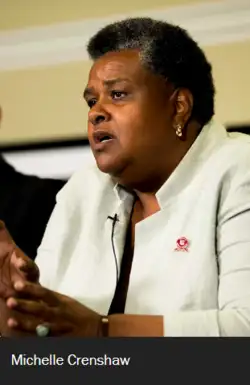
Stepping outside one's comfort zone is also important, says Crenshaw. "It's learning to get along with other people," she said. "I've always wandered and wanted to see what's on the other side and interact with people. The more you interact culturally with others, it opens up conversation and that can lead you to the next door. I won't say it's been easy, but I've been surviving as a union member for 30 years."
Morgan noted how he brought Crenshaw on as camera operator for his award-winning series The Ranch, and thanked Netflix for its support. Mentoring, he said, is an important way to give back. "My dad was in [American Federation of Musicians] Local 47, and I saw the camaraderie among the union musicians," he recalls.
Witmer asked Morgan and Simmons to describe if the industry today has changed from what it was like when they were starting their careers. "I just finished my fourth pilot in the last two months," said Morgan. "I go to these production meetings and I'm the only [African American] guy sitting at the table. It's very discouraging; I'd like to see more."
Simmons says he had the same experience on-set. "Guys would cover up the lens when I was a PA, they'd hide what they were doing," he recalled. "But little by little, things are taking a different shape." He noted that, "there's a problem of optics in our society. When you think of a cinematographer, do you see Bradford and Rachel [Morrison] immediately? When you think of a director, what picture pops to your mind?" Bias is ingrained and unconscious, he said: "A lot of us think our heads are in one place, and then you take the Harvard University bias test, and it'll make you feel embarrassed. We have to personally address those biases, consciously and unconsciously, when you select your crew."
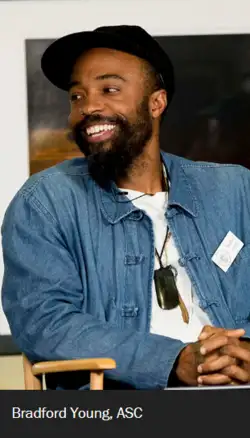
Young emphasized that "we are a nation of people who are sick. White supremacy is out there, and those who benefit from white supremacy suffer too. I'm not a healed person. In my community, there are people with real solutions for the post-imperialist, post-slavery black mind. Where are white psychologists writing about the post-imperialist, post-slavery white mind? If you're white and deny it, your grandchildren will have to deal with it. Same if you're black."
New York Times author David Brooks wrote about how "winning a cultural war is more powerful than legislation," Young added. "The beauty of the previous panel is that people not empowered to talk 30 years ago felt empowered to talk today. If you don't like that cinema isn't reflecting the culture, then we have to make our own movies. The art form has the vestiges of white supremacy. This is uncomfortable, but none of us like it. We have to change the conversation, and we can't legislate it."
In response to a question from Witmer, Mayen described how he found community in a foreign country after moving to the U.S. "Sleeping on my cousin's couch, I needed to feel that I wasn't crazy to be here and that there were others like me striving for the same ideal," he recalled. "Just hanging out where a lot of filmmakers and people with similar ideas at Mole Richardson and AFI made me feel like I belonged somewhere."
Crenshaw found community in Los Angeles after making the difficult decision to leave Detroit. "I wanted to challenge myself more," she said. "I was comfortable there working as a 2nd AC, but there was no room for me to move up. My first experience of Hollywood was working on Home Alone 2 and I fell in love. I met Johnny [Simmons] and did music videos and got into focus pulling. Some of the people I worked with didn't want to move me up, but I was ready for the next challenge, and here I am 20 years later, making a living as an operator."
Witmer asked the panelists how they create a balance between making a living and choosing projects that "present narratives you can be proud of."
"That's a tough call," said Morgan. "It the opportunity comes up to do a series, you may not like the series, but I'm responsible for 35 to 40 people [being employed], and they all have other people. It's not just for myself."
Simmons agreed: "I've taken a lot of shows that I probably would not have wanted to do, but being able to hire people and change peoples' lives and help families has been a motivating factor." He recalled how, at this year's ASC Awards ceremony, ASC President Kees van Oostrum asked all the women cinematographers in the room to stand up. He then asked all the cinematographers who are women or people of color to stand. "I would like to acknowledge these people," Simmons said. "I see cinematographers changing the face of the industry, and taking on the responsibility of making that move to help the new way of viewing us. There are probably more of them here today than I've seen gathered in one place - and then years ago, you couldn't have done that. This is a very precious moment and I'm so glad the ASC is moving in this direction. It's a big deal."
One audience member asked about an issue not yet mentioned during the day: Women coming back into the industry after raising children. "We have great skills that translate from what we've been doing or from before we left that we're willing to re-use," she said. "Are there programs to help us re-enter? How do I get back in the room and make a living again?"
From the audience, Bill Dill, ASC addressed the question: "I say this as someone who is not unfamiliar with the process of starting and trying. The first thing, don't worry if you're talented. The world is full of talented bums. Raw, dogged determination is more important. Talent can be corrupted and be a weapon used against you. You're a cinematographer because you say you're one. Then go out and prove it. I think that's all there is to it."
Young added, "This is a wonderful time to be making movies, with Ava DuVernay around. She is my teacher and my collaborator. I was with her when we made Middle of Nowhere for $50,000, without asking anyone to do it for her. From I Will Follow to Middle of Nowhere to Selma, the films she made afforded her to create a space for us. She's a great example of the answer to the question of 'What do I do?' She made her film by any means necessary and made sure it had her imprint. We come to this asking other people give us permission to do something, but don't expect this industry to hand us anything. They don't even pass it on to their children."
"Being a cinematographer is always a state of becoming," said Simmons. "I tell a lot of people who call me their mentor that even a bad experience on a film is a good experience. From every project I've worked on, we grow and learn things we never want to do again. From those early experiences, I realized I could make films, commercials, and so and make it a pleasant experience, rather than being stepped on. We can encourage everyone in the process of making movies and answering studio needs."
Crenshaw added that "part of that is not being ashamed of who you are. I'm happy to be kind and nurturing. If that's part of my character and us doing a job together that we both enjoy, more power to us both. And you do learn from your mistakes and that will challenge you to be better. That's what I take away from all my experiences, pleasant and unpleasant."
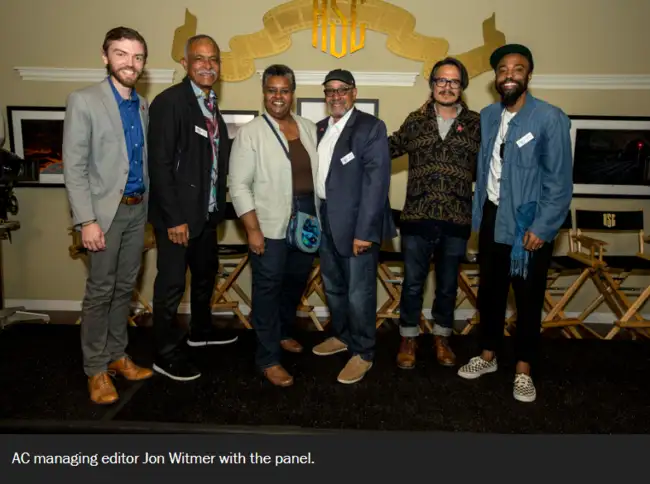
"We all get beat down and lose our confidence and look in the mirror when we brush our teeth and don't see a cinematographer if we haven't had a job in awhile," concludes Simmons. "At a certain point, things begin to go smoothly and you turn into somebody. You can't forget those days and they make you realize you have to uplift people and create a [welcoming] situation on a crew when a new PA appears. One of those PAs ended up directing five years later and asked me to shoot three commercials. You never know how insignificant a moment is to you and how significant it is to someone else."
Event photos by Willie Toledo
In this third segment of the ASC Vision Committee's day-long event on diversity and inclusion held at the ASC Clubhouse on April 21, an impressive group of motion picture professionals talked about the challenges they face as people of color in the industry. The event, sponsored by Netflix, also featured a keynote address on the research done at the Annenberg Inclusion Initiative (Part I) and a discussion of women in the industry on strategies for gender parity (Part II).
Panelists participating in the day's ending discussion were camera operator Michelle Crenshaw and cinematographers Eduardo Mayen; Donald A. Morgan, ASC; John Simmons, ASC and Bradford Young, ASC.
"I realized how much movies had turned me and my image of self upside down. It changed my spirit. I knew movies could start a revolution."

Moderator and American Cinematographer managing editor Jon Witmer asked the panelists what inspired them to enter the business, and everyone spoke about the importance of having mentors early in their careers. Simmons said historian/film director Carlton Moss was his mentor. "He lived with W.E.B. DuBois and was Lena Horne's manager and wrote The Negro Solider for Frank Capra," he recalled. "He looked at my photographs and told me that I had the eye of a cinematographer and started sending me copies of American Cinematographer. Then he sent me some film; I looked through the viewfinder and saw the shutter movement and it was all over after that."
Mayen said he grew up in El Salvador during that country's long civil war. "We couldn't go out and play, so movies were the inspiration," he said. "My dad wouldn't censor what we saw - he thought what was going on outside was scarier. I fell in love with cinema and began working for a production company, and Rodrigo Prieto [ASC] ended up being my mentor. Watching a professional cinematographer working, first-hand, planted the seed."
Young recounted how he was expected to follow the family mortuary business, but at Howard University he met Ethiopian filmmaker Haile Gerima: "I signed up for Third World cinema and it was 18 years of unpacking how much American movies impacted me and the notions of my community. I realized how much movies had turned me and my image of self upside down. It changed my spirit. I knew movies could start a revolution."
Crenshaw grew up in Detroit in a "labor, hands-on hard working environment." She started shooting and developing still photos when she was 16. "I fell in love with the instant gratification of images that reflected my environment," she said. "I went to Columbia College, took one film class and was hooked."
"If you show commitment and passion, eventually someone will take you under their wing."

Morgan tried several different jobs before he got one in the mailroom at Los Angeles TV station KTTV. In his spare time, he'd go on stage. "I didn't understand it, but it seemed like it was fun," he said. "Then I got to be part of the crew." He found himself drawn to lighting, and his first mentor was Tom Schamp, a lighting director on Playhouse 90: "We had great conversations about multi-camera lighting, and that was a passion. I started looking at black-and-white movies and wanted to bring more of that look to what I was doing."
Witmer asked how to find a mentor. "You have to be willing to do work," said Crenshaw, who also called out Stephen H. Burum, ASC in the audience as another of her mentors. "If you show commitment and passion, eventually someone will take you under their wing. I got in the union in Chicago, and my whole career there was someone willing to support and embrace my passion. When I moved to California, I reached out to Johnny [Simmons]. I was a focus puller on an Isidore Mankofsky [ASC] movie where Johnny was operator."
"We all have a responsibility to reach back and open our doors and hearts to people who have a passion to do this," added Simmons. "I kept hearing about Joe Wilcox and Joseph Calloway [who was present at the event], these two black cinematographers, and I finally met them. There have been so many people on whose shoulders I stand, and so many people who presented obstacles that gave me the perseverance to overcome. What you're looking at on this panel are people who have persevered against obstacles that they couldn't really complain about."
"The idea of building community helped me. We built it around the idea of a safe space where you could be a practitioner of your story."

Simmons told the story of his first day on the job at Dove Films, founded by progressives Cal and Roz Bernstein: "I walk into a grip truck, and I see a grip box covered with derogatory images of black people, Cesar Chavez, Asians. I got out of that truck and called Carlton about this strange situation. He asked, 'Do you want to be a cinematographer? Do you know any black people doing this?'" He persevered.
Mayen noted that receiving the International Camera Guild's Emerging Cinematographer Award was crucial in allowing his career to flourish: "It gives loaders and camera assistants a chance to showcase their work and get exposure and more opportunities. That's a testament to what the union is doing now."
Young asked if film school is even relevant. "I used to be quite torn about this question," he said. "I went to film school and it wasn't always enjoyable. I saw people who didn't go to film school out in the world making films. Now I'm trying to make a case for community building and a pedagogy of mentorship and inclusion that exist more naturally."
His first jobs out of school were music videos by film school friends, which is where director Dee Reese found him; the two have worked together since the 2007 short Pariah. "The idea of building community helped me," Young said. "We built it around the idea of a safe space where you could be a practitioner of your story. Mentorship has that power too; The only place I felt safe was in Haile's house, or Johnny's [Simmons] studio."
"I go to these production meetings and I'm the only [African American] guy sitting at the table. It's very discouraging; I'd like to see more."

Stepping outside one's comfort zone is also important, says Crenshaw. "It's learning to get along with other people," she said. "I've always wandered and wanted to see what's on the other side and interact with people. The more you interact culturally with others, it opens up conversation and that can lead you to the next door. I won't say it's been easy, but I've been surviving as a union member for 30 years."
Morgan noted how he brought Crenshaw on as camera operator for his award-winning series The Ranch, and thanked Netflix for its support. Mentoring, he said, is an important way to give back. "My dad was in [American Federation of Musicians] Local 47, and I saw the camaraderie among the union musicians," he recalls.
Witmer asked Morgan and Simmons to describe if the industry today has changed from what it was like when they were starting their careers. "I just finished my fourth pilot in the last two months," said Morgan. "I go to these production meetings and I'm the only [African American] guy sitting at the table. It's very discouraging; I'd like to see more."
Simmons says he had the same experience on-set. "Guys would cover up the lens when I was a PA, they'd hide what they were doing," he recalled. "But little by little, things are taking a different shape." He noted that, "there's a problem of optics in our society. When you think of a cinematographer, do you see Bradford and Rachel [Morrison] immediately? When you think of a director, what picture pops to your mind?" Bias is ingrained and unconscious, he said: "A lot of us think our heads are in one place, and then you take the Harvard University bias test, and it'll make you feel embarrassed. We have to personally address those biases, consciously and unconsciously, when you select your crew."
"If you don't like that cinema isn't reflecting the culture, then we have to make our own movies."

Young emphasized that "we are a nation of people who are sick. White supremacy is out there, and those who benefit from white supremacy suffer too. I'm not a healed person. In my community, there are people with real solutions for the post-imperialist, post-slavery black mind. Where are white psychologists writing about the post-imperialist, post-slavery white mind? If you're white and deny it, your grandchildren will have to deal with it. Same if you're black."
New York Times author David Brooks wrote about how "winning a cultural war is more powerful than legislation," Young added. "The beauty of the previous panel is that people not empowered to talk 30 years ago felt empowered to talk today. If you don't like that cinema isn't reflecting the culture, then we have to make our own movies. The art form has the vestiges of white supremacy. This is uncomfortable, but none of us like it. We have to change the conversation, and we can't legislate it."
In response to a question from Witmer, Mayen described how he found community in a foreign country after moving to the U.S. "Sleeping on my cousin's couch, I needed to feel that I wasn't crazy to be here and that there were others like me striving for the same ideal," he recalled. "Just hanging out where a lot of filmmakers and people with similar ideas at Mole Richardson and AFI made me feel like I belonged somewhere."
Crenshaw found community in Los Angeles after making the difficult decision to leave Detroit. "I wanted to challenge myself more," she said. "I was comfortable there working as a 2nd AC, but there was no room for me to move up. My first experience of Hollywood was working on Home Alone 2 and I fell in love. I met Johnny [Simmons] and did music videos and got into focus pulling. Some of the people I worked with didn't want to move me up, but I was ready for the next challenge, and here I am 20 years later, making a living as an operator."
"I've taken a lot of shows that I probably would not have wanted to do, but being able to hire people and change peoples' lives and help families has been a motivating factor."
Witmer asked the panelists how they create a balance between making a living and choosing projects that "present narratives you can be proud of."
"That's a tough call," said Morgan. "It the opportunity comes up to do a series, you may not like the series, but I'm responsible for 35 to 40 people [being employed], and they all have other people. It's not just for myself."
Simmons agreed: "I've taken a lot of shows that I probably would not have wanted to do, but being able to hire people and change peoples' lives and help families has been a motivating factor." He recalled how, at this year's ASC Awards ceremony, ASC President Kees van Oostrum asked all the women cinematographers in the room to stand up. He then asked all the cinematographers who are women or people of color to stand. "I would like to acknowledge these people," Simmons said. "I see cinematographers changing the face of the industry, and taking on the responsibility of making that move to help the new way of viewing us. There are probably more of them here today than I've seen gathered in one place - and then years ago, you couldn't have done that. This is a very precious moment and I'm so glad the ASC is moving in this direction. It's a big deal."
One audience member asked about an issue not yet mentioned during the day: Women coming back into the industry after raising children. "We have great skills that translate from what we've been doing or from before we left that we're willing to re-use," she said. "Are there programs to help us re-enter? How do I get back in the room and make a living again?"
From the audience, Bill Dill, ASC addressed the question: "I say this as someone who is not unfamiliar with the process of starting and trying. The first thing, don't worry if you're talented. The world is full of talented bums. Raw, dogged determination is more important. Talent can be corrupted and be a weapon used against you. You're a cinematographer because you say you're one. Then go out and prove it. I think that's all there is to it."
"You never know how insignificant a moment is to you and how significant it is to someone else."
Young added, "This is a wonderful time to be making movies, with Ava DuVernay around. She is my teacher and my collaborator. I was with her when we made Middle of Nowhere for $50,000, without asking anyone to do it for her. From I Will Follow to Middle of Nowhere to Selma, the films she made afforded her to create a space for us. She's a great example of the answer to the question of 'What do I do?' She made her film by any means necessary and made sure it had her imprint. We come to this asking other people give us permission to do something, but don't expect this industry to hand us anything. They don't even pass it on to their children."
"Being a cinematographer is always a state of becoming," said Simmons. "I tell a lot of people who call me their mentor that even a bad experience on a film is a good experience. From every project I've worked on, we grow and learn things we never want to do again. From those early experiences, I realized I could make films, commercials, and so and make it a pleasant experience, rather than being stepped on. We can encourage everyone in the process of making movies and answering studio needs."
Crenshaw added that "part of that is not being ashamed of who you are. I'm happy to be kind and nurturing. If that's part of my character and us doing a job together that we both enjoy, more power to us both. And you do learn from your mistakes and that will challenge you to be better. That's what I take away from all my experiences, pleasant and unpleasant."

"We all get beat down and lose our confidence and look in the mirror when we brush our teeth and don't see a cinematographer if we haven't had a job in awhile," concludes Simmons. "At a certain point, things begin to go smoothly and you turn into somebody. You can't forget those days and they make you realize you have to uplift people and create a [welcoming] situation on a crew when a new PA appears. One of those PAs ended up directing five years later and asked me to shoot three commercials. You never know how insignificant a moment is to you and how significant it is to someone else."
theasc.com
Email This Article | Print This Article
No Comments
Post Comment









